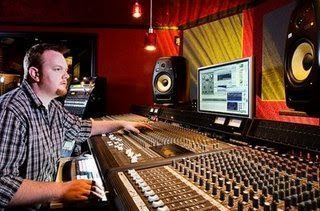
Hello kiddies...Tales from the Crypt anyone? Anyhoo, welcome back, all. Glad to see your shinning faces once again. That's right, I can see you right now. Do not be alarmed.
Today we'll be discussing the importance of the seemingly elusive metronome (or click). Use of a metronome in practice, performing, and especially studio recording will make you a better artist/band by improving your internal clock, and save you time and money in the studio.
In a band setting it is most beneficial for the drummer to have a click so they stay on time and then the rest of the band can follow. This translates magnificently into a live setting, especially when the drummer continues to use the click during performances. The easiest way to do this is create the click track in Garage Band, or any other recording software, and load it onto an MP3 player for the drummer. The biggest reason to do this is groove. The foundation to any band is the rhythm section. If it's not locked in, then the rest of the band can't get locked in, and the people attempting to enjoy your music can't get locked in. This translates into a poor experience for everyone, and you don't keep band members or fans around if you can't quite nail this down.
As a solo artist (you and an acoustic guitar and/or piano for instance), it is extremely advantageous to practice and/or perform to a click for the same reasons listed above. Especially because when there are no drums, you and your instrument becomes the rhythm section.
In a studio session, this is key for many reasons. First of all, if you're used to practicing to a click, then recording to a one shouldn't throw you off at all. This should make your sessions go much smoother and cause you to take less time in the studio, which is the first way it will save you money. The second way is that when you record to a click, the engineer will spend much less time in the editing stage making sure all your instruments line up with each other; another crucial aspect to a quality final product in many cases.
What does this mean for everyone? Figure out the tempos to all your songs, and practice to a click. It's going to be a little odd at first if you haven't done it before, but you'll get used to it as long as you stick with it.
Good luck, kids!
Kyle








